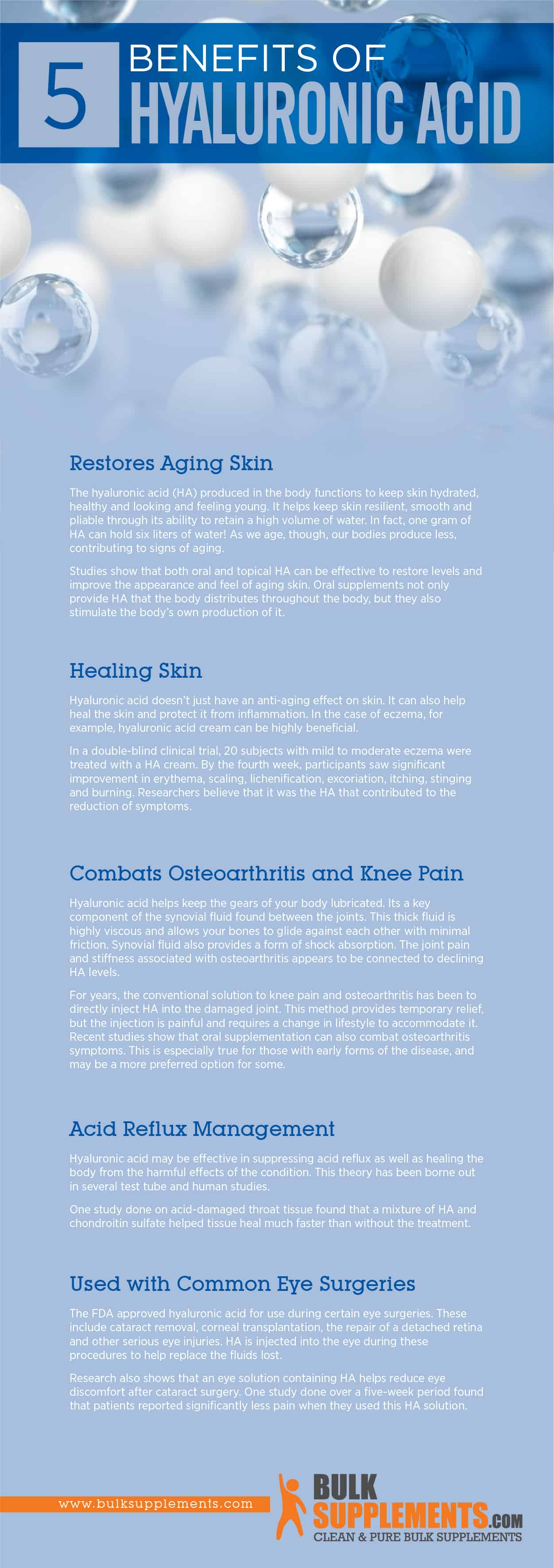Hyaluronic Acid: Benefits, Side Effects & Dosage
by James Denlinger Digital Marketing StrategistWhat is Hyaluronic Acid?
Hyaluronic acid (HA) was simply known as a “goo” until about the 1970s. Scientists weren’t exactly sure what to make of this substance, other than that it was highly viscous (x). Today we know a lot more about it, to the delight of those who look and feel younger by taking it!
So what is hyaluronic acid? To put it simply, it’s a naturally occurring polysaccharide found in the human body. The joints, eyes and skin contain the highest concentrations.
No longer considered just a goo, hyaluronic acid is finally getting the respect it deserves. It now has applications as a healing aid in surgery, a treatment for osteoarthritis and a tool to combat skin aging. It’s available in oral supplements, topical preparations and eye drops. As an injectable, it has both therapeutic and cosmetic uses.
Benefits of Hyaluronic Acid
Restores Aging Skin
The hyaluronic acid (HA) produced in the body functions to keep skin hydrated, healthy and looking and feeling young. It helps keep skin resilient, smooth and pliable through its ability to retain a high volume of water. In fact, one gram of HA can hold six liters of water! As we age, though, our bodies produce less, contributing to signs of aging.
Studies show that both oral and topical HA can be effective to restore levels and improve the appearance and feel of aging skin. Oral supplements not only provide HA that the body distributes throughout, but they also stimulate the body’s own production of it.
One study, for example, looked at the effects of oral supplements on 60 healthy males and females. Participants, who were between the ages of 22 to 59, received either a HA preparation or placebo. Their wrinkles were evaluated after 12 weeks and those who received the HA saw a reduction in wrinkles and overall improvement in skin.
Another study looked at 20 female subjects with healthy skin between the ages of 45 to 60. After only 40 days, the group taking the HA oral supplements noticed a significant decrease in skin roughness and wrinkle depths. In addition, no side effects were noted.
Hyaluronic acid supplements can even simply help keep skin better hydrated.
Healing Skin
Hyaluronic acid doesn’t just have an anti-aging effect on skin. It can also help heal the skin and protect it from inflammation. In the case of eczema, for example, hyaluronic acid cream can be highly beneficial.
In a double-blind clinical trial, 20 subjects with mild to moderate eczema were treated with a HA cream. By the fourth week, participants saw significant improvement in erythema, scaling, lichenification, excoriation, itching, stinging and burning. Researchers believe that it was the HA that contributed to the reduction of symptoms.
There are also signs that HA may be an effective barrier against many common pathogens. This is because it might reduce “biofilm” (microorganisms that collect together in a sticky film on the skin’s surface). Lab studies show that HA can have antimicrobial effects on the skin and help protect us from pathogenic infections.
Combats Osteoarthritis and Knee Pain
Hyaluronic acid helps keep the gears of your body lubricated. Its a key component of the synovial fluid found between the joints. This thick fluid is highly viscous and allows your bones to glide against each other with minimal friction. Synovial fluid also provides a form of shock absorption. The joint pain and stiffness associated with osteoarthritis appears to be connected to declining HA levels.
For years, the conventional solution to knee pain and osteoarthritis has been to directly inject HA into the damaged joint. This method provides temporary relief, but the injection is painful and requires a change in lifestyle to accommodate it. Recent studies show that oral supplementation can also combat osteoarthritis symptoms. This is especially true for those with early forms of the disease, and may be a more preferred option for some.
A series of randomized, double-blinded, placebo-controlled trials demonstrates the benefit of HA in treating osteoarthritis, particularly when it comes to decreasing knee pain and improving strength. Its effectiveness is therefore viewed as a viable alternative to invasive procedures such as injections or bone surgery.
Acid Reflux Management
Hyaluronic acid may be effective in suppressing acid reflux as well as healing the body from the harmful effects of the condition. This theory has been borne out in several test tube and human studies.
One study done on acid-damaged throat tissue found that a mixture of HA and chondroitin sulfate helped tissue heal much faster than without the treatment.
Another study performed with human subjects discovered that taking a supplement of chondroitin sulfate and HA, together with an acid-reducing medication, decreased reflux symptoms 60 percent more than taking an acid-reducing medication alone. A second study on this same combination showed that it was five times more efficient at reducing acid reflux symptoms than a placebo.
Used with Common Eye Surgeries
The FDA approved hyaluronic acid for use during certain eye surgeries. These include cataract removal, corneal transplantation, the repair of a detached retina and other serious eye injuries. HA is injected into the eye during these procedures to help replace the fluids lost.
Research also shows that an eye solution containing HA helps reduce eye discomfort after cataract surgery. One study done over a five-week period found that patients reported significantly less pain when they used this HA solution.
Eye drops containing hyaluronic acid can also help soothe dry eyes.
 PIN IT
PIN ITDid You Know?
Hyaluronic acid is extremely good at holding onto water. It can hold about 1,000 times its weight in water. To visualize that, just imagine a dry, one-pound pillow soaking up, and retaining, about 1,000 pounds of water!
When you are in your 20s, the body has about 15 grams of HA. The amount the body makes balances the amount it uses. By the time you hit your 40s, however, your body can only make 50 percent of the HA it needs to function optimally.
Hyaluronic acid is also a common cosmetic injectable used for lip fillers.
Hyaluronic Acid Dosage and Side Effects
A vast array of forms and concentrations of hyaluronic acid are available. There is no one standard dosage recommendation because it can be used in so many ways. After choosing a supplement based on your needs, the best course of action may be to simply follow the instructions on the label.
Hyaluronic acid is considered very safe with few known side effects. It should not be taken by people who are pregnant or breastfeeding. Some research, however, is exploring the possibility that hyaluronic acid may encourage the growth of certain cancer cells.
The Bottom Line
Hyaluronic acid’s public image has come a long way since its discovery. No longer seen as a mysterious goo, it’s been transformed into countless products that can be applied topically, ingested or injected.
It’s applications are as numerous as its delivery forms. From improving the appearance of skin to greasing creaky joints, HA is a go-to supplement for age-related complaints. It’s also used during and after eye surgeries and to help manage the effects of acid reflux.
Sponsor Ads
Created on Apr 4th 2020 15:28. Viewed 367 times.




